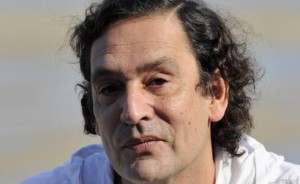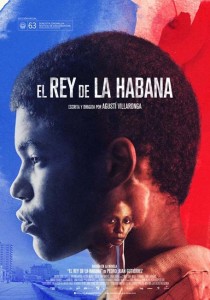SPANISH FILM “THE KING OF HAVANA” NAKED REALITY OF CUBA DURING THE “SPECIAL PERIOD”.
A stark picture of that period Cuba landed at San Sebastian Festival. The film “The King of Havana” was shown at the Spanish festival. According to Agusti Villaronga, the “cursed”, as it was called, its Spanish film director, “Nothing is invented.”
The social cinema took over San Sebastian showing two stark realities in the race for the Golden Shell: if “King of Havana” portrays the sordid and stark Cuba’s “special period”, the other “Moira” tells the tragic fate of a young Georgian.
Agusti Villaronga, once considered one of the “cursed directors” of Spanish cinema, returns after the success of “Black Bread” adapting the novel by Pedro Juan Gutierrez, one of the most acclaimed chroniclers of that Cuba “dirty” to which many They prefer not to look.
“There is nothing invented at all,” stressed the director at the comments of some of the criticism bothered by the brutality of the film. And is that if Cuba was poor, “becomes much poorer” in those early 90s, after the fall of the Soviet bloc and the tightening of the US embargo, he said.
https://youtu.be/gScQoKVv48M
In its aim to “give voice to the voiceless,” Villaronga tells the story of Reynaldo (Maykol D. Tortoló), a teenager who escapes from a reformatory and struggle to survive in the dilapidated streets of Centro Habana. No home or work, the attraction “King” will have to fight every day to get some food in their mouths and find a roof to sleep.
To exploit his body between whoever I enjoy living Magda, the wife of which the protagonist falls in love. This “reacts like an animal” to situations in which he lived, said the actress Yorkanda Ariosa. But before judging, think “A wee bit more” in which hunger and poverty are able to generate.
However, this tragic portrait in which there is room for hope contrasts with the vitality and the laughter of the Cubans. Although the film had to be shot in Santo Domingo, as he had tried to do earlier from Cuba and the authorities “were angry that foreigners were now,” said the filmmaker. Therefore, the greatest wish of the whole team is that “The King of Havana” can be seen in Cuba.
“I see the time when it is put, I know the Cuban truly going to enjoy it because it is a stage that has spent most of the people in Cuba and when you see it on the big screen will thank you,” he said the protagonist and grandson of the iconic singer Celeste Mendoza.
Agencies / LaCapital.ar / InternetPhotos / Excerpts / YouTube.
The Cuban History, Hollywood.
Arnoldo Varona, Editor.
PELÍCULA ESPAÑOLA “EL REY DE LA HABANA” DESNUDA EN PANTALLA ESA CUBA DEL “PERIODO ESPECIAL”.
Una foto descarnada de ese periodo cubano aterrizó en el Festival de San Sebastián. El filme “El Rey de La Habana” se mostró en el festival español. Según su director Agustí Villaronga,el director “maldito” del cine español, “No hay nada inventado”.
El cine más social se adueñó de San Sebastián mostrando dos crudas realidades en la carrera por la Concha de Oro: si “El Rey de La Habana” retrata la Cuba sórdida y descarnada del “período especial”, la otra “Moira” narra el trágico destino de un joven georgiano.
Agustí Villaronga, antaño considerado uno de los “directores malditos” del cine español, regresa tras el éxito de “Pa negre” adaptando la novela homónima de Pedro Juan Gutiérrez, uno de los más aclamados cronistas de esa Cuba “sucia” a la que muchos prefieren no mirar.
“No hay nada inventado en absoluto”, recalcó el cineasta ante los comentarios de una parte de la crítica incomodada por la brutalidad del filme. Y es que si Cuba era pobre, “se vuelve mucho más pobre” en esos primeros años 90, tras la caída del bloque soviético y el recrudecimiento del embargo de Estados Unidos, añadió.
https://youtu.be/gScQoKVv48M
En su objetivo de “dar voz a los sin voz”, Villaronga narra la historia de Reynaldo (Maykol D. Tortoló), un adolescente que escapa de un reformatorio y lucha por sobrevivir en las desvencijadas calles de Centro Habana. Sin casa ni trabajo, el atractivo “Rey” tendrá que pelear cada día por llevarse algo de comer a la boca y hallar un techo donde dormir.
De explotar su cuerpo entre quienquiera disfrutarlo vive Magda, la mujer de la que se enamora el protagonista. Esta “reacciona como si fuera un animal” a las situaciones que le tocó vivir, explicó la actriz Yorkanda Ariosa. Pero antes de juzgarla, hay que pensar “un poquitico más” en lo que el hambre y la miseria son capaces de generar.
No obstante, este retrato trágico en el que no hay hueco para la esperanza contrasta con la vitalidad y las carcajadas de los cubanos. Aunque la película tuvo que filmarse en Santo Domingo, pues se había intentado hacer antes desde Cuba y a las autoridades “les molestaba que ahora fueran extranjeros”, contó el cineasta. Por eso, el mayor deseo de todo el equipo es que “El Rey de La Habana” pueda verse en Cuba.
“No veo la hora en que se ponga, sé que el cubano de verdad la va a disfrutar mucho porque es una etapa que ha pasado la mayoría de la gente en Cuba y cuando lo vean en la gran pantalla lo van a agradecer”, dijo el protagonista y nieto de la emblemática cantante Celeste Mendoza.
Agencias/LaCapital.ar/InternetPhotos/Excerpts/YouTube.
The Cuban History, Hollywood.
Arnoldo Varona, Editor.





